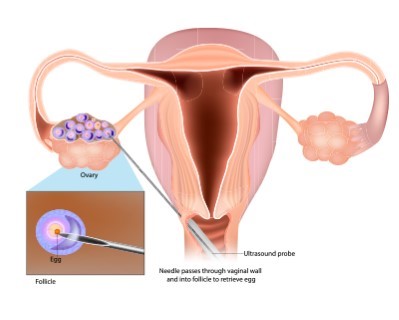Egg Retrieval
- Purpose: Collects eggs from the ovaries for fertilization.
- Procedure: A needle is inserted into the ovarian follicles under ultrasound guidance to retrieve the eggs.
-
Note: The information provided here applies to standard Egg Retrieval procedures under typical conditions. However, specifics may vary based on individual factors, such as the patient’s overall health, the response to fertility medications, and any complications that might arise during or after the procedure. The complexity of the procedure and the patient’s unique circumstances will also impact the recovery process.
Inpatient/Outpatient
Egg retrieval is typically performed as an outpatient procedure, allowing most patients to return home the same day after a short recovery period.Hospital Stay Duration
Patients undergoing egg retrieval generally do not require an overnight hospital stay. They are usually discharged a few hours after the procedure, once they have recovered from sedation or anesthesia and are stable.Type of Anesthesia
Egg retrieval is commonly performed under light sedation or general anesthesia to ensure the patient is comfortable and pain-free during the procedure. The choice of anesthesia depends on the patient’s preference and the healthcare provider’s recommendation.Travel After Procedure
Patients are generally advised to avoid long-distance travel for at least 24 to 48 hours after the procedure to allow for initial recovery and to monitor for any potential complications, such as abdominal discomfort or bloating.Pre-procedure Preparation
Preparation for egg retrieval involves following specific instructions from the fertility specialist, such as administering hormonal injections to stimulate the ovaries, fasting before the procedure, and adjusting medications as needed. Patients should also arrange for someone to drive them home after the procedure.Procedure Duration
The egg retrieval procedure typically lasts between 20 to 30 minutes. During the procedure, the fertility specialist uses a thin needle guided by ultrasound to retrieve eggs from the ovaries through the vaginal wall.Recovery Time
Recovery from egg retrieval is usually quick, with most patients resuming light activities the next day. However, it’s important to avoid strenuous activities for a few days to allow the body to recover fully. Some patients may experience mild cramping, bloating, or spotting, which should resolve within a few days.Estimated Cost
The cost of egg retrieval can vary depending on factors such as the fertility clinic’s expertise, the medications used, and geographic location. Patients should consult their fertility clinic for accurate cost information, including any additional costs for medications or follow-up treatments.Post-procedure Care
Post-operative care for egg retrieval includes managing any discomfort and monitoring for signs of complications, such as ovarian hyperstimulation syndrome (OHSS), which can occur in response to fertility medications. Patients should follow their healthcare provider’s instructions regarding rest, fluid intake, and any prescribed medications. Follow-up appointments are important to assess the number and quality of the retrieved eggs and to plan the next steps in the fertility treatment process. Any signs of complications, such as severe pain, excessive bloating, or difficulty breathing, should be reported to the healthcare provider immediately.

